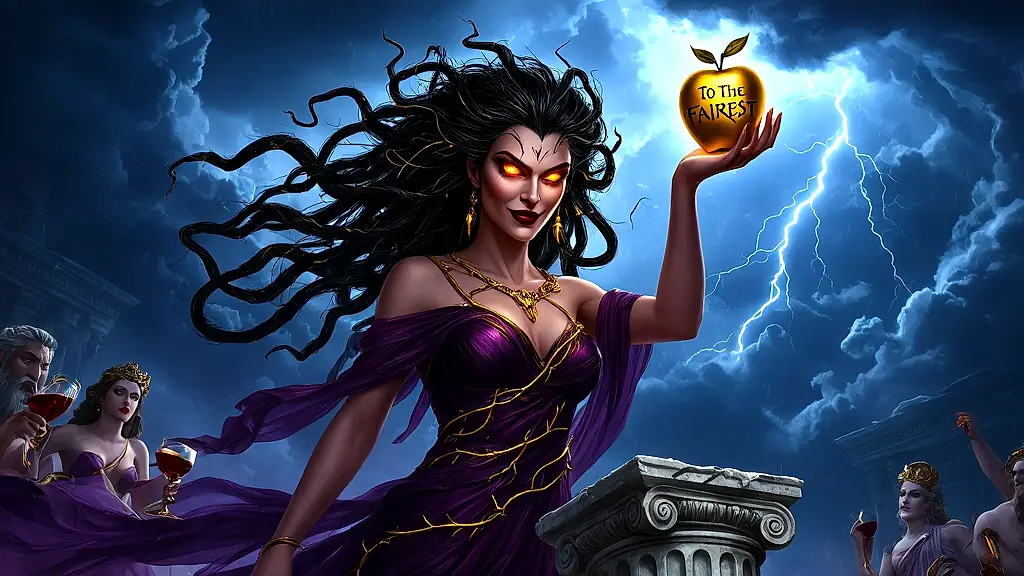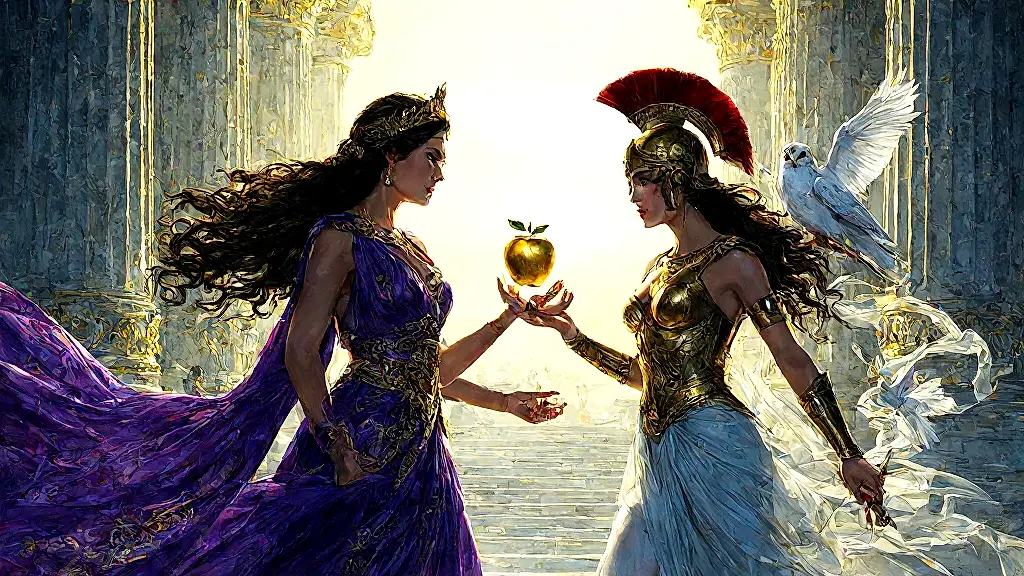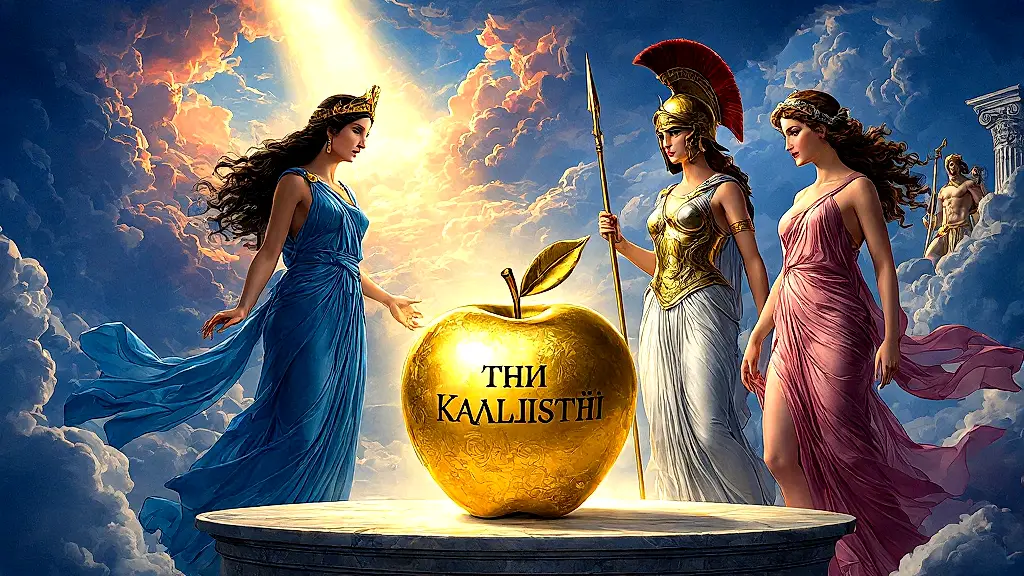The Apple Of Discord Greek Mythology Story And Its Meaning
Picture this: one small, petty act leads to a war that lasts ten years. In Greek mythology, the Apple of Discord – a golden apple thrown by Eris, the goddess of strife – did exactly that. It had the words “To the Fairest” written on it, which sparked a fierce rivalry among Hera, Athena, and Aphrodite. Their fight over it eventually caused the Trojan War.
Key Points:
- Eris, the goddess of trouble, threw a golden apple with To the Fairest written on it to cause a fight at a wedding she wasn’t invited to.
- Hera, Athena, and Aphrodite argued over the apple because each thought she was the fairest, leading to a big fight.
- Paris, a Trojan prince, had to pick the fairest goddess and chose Aphrodite because she promised him Helen, the most beautiful woman.
- Paris taking Helen started the Trojan War, which lasted ten years and involved many Greek heroes.
- The apple stands for how small things can cause big problems, especially when pride gets in the way.
- Other Greek myths have golden apples too, like the ones from the Hesperides that give immortality, but Eris’ apple was just for causing trouble.
- Norse myths have their own golden apples, but unlike Eris’, these keep the gods young instead of starting fights.
Eris, the daughter of Nyx (the night), wasn’t invited to the wedding of Peleus and Thetis. So she got revenge in the pettiest way possible – by tossing the apple into the celebration. It’s like dropping a bomb disguised as a harmless comment, except this one started a war.
Some versions of the myth say Zeus planned the conflict, but the apple’s meaning stays the same: beauty, rivalry, and chaos. Next, we’ll break down how this myth played out, from the gods’ egos to Paris’s disastrous decision.
Apple Of Discord Greek Mythology: Overview and Key Facts
| Aspect | Details | Sources and Notes |
|---|---|---|
| What Was It? | A golden apple with “To the Fairest” written on it. Eris threw it to cause trouble between the goddesses. | Homer’s Iliad (Book 24), Hyginus’ Fabulae (92). Sometimes called the Apple of Eris. |
| Who Created It? | Eris, the goddess of strife. Some say she made it herself. Others think it was magical. | Hesiod’s Theogony (225–232) calls her Nyx’s daughter. Later writers disagree. |
| Where Did It Appear? | At the wedding of Peleus and Thetis. Eris wasn’t invited, so she threw the apple at Hera, Athena, and Aphrodite. | Apollodorus’ Bibliotheca (3.2). Some say Zeus planned it. |
| Why Did It Matter? | The words “To the Fairest” started a fight. Paris of Troy had to choose, and Aphrodite bribed him with Helen’s love. That led to the Trojan War. | Euripides’ Trojan Women (920–932) says Paris’s choice was the turning point. |
| Symbolism | It stands for gods fighting, human greed, and disasters nobody planned. It looked beautiful but caused destruction. | Graves’ Greek Myths (1960) compares it to modern rivalries. |
| Other Golden Apples | Not the same as the Hesperides’ apples, which gave immortality. Eris’s apple was just meant to start trouble. | Hesiod’s Theogony (215–216); Hercules’ story in Apollodorus 2.5.11. |
How the Apple of Discord Came to Be
The golden apple situation started because someone held a grudge. And that single act of resentment ended up disrupting lives across both the divine and mortal worlds.
Eris: The Goddess Who Loved Stirring Trouble
Imagine someone who constantly caused conflicts and enjoyed the resulting chaos. In Greek mythology, that was Eris, the goddess of strife and discord. Hesiod’s Theogony states she was the daughter of Nyx (Night) with no father, although some later versions claim Zeus might have been her parent. Eris wasn’t merely a minor instigator – she represented the very embodiment of conflict. Her nature compelled her to create discord among both gods and humans.
Ancient sources reveal several important facts about Eris:
- She was the sister of Ares, the war god, demonstrating how Greek mythology linked strife and warfare
- Her children included other destructive forces like Ponos (Toil), Lethe (Forgetfulness), and Limos (Starvation)
- She appeared at nearly every major mythological battle, from the Gigantomachy to the Trojan War
- She was typically accompanied by her attendants Hysminai (Battles) and Makhai (Wars)
While other gods promoted harmony, Eris actively worked against it. This tendency would soon lead to disastrous consequences at a particular divine wedding…

Eris, the Greek goddess of strife, caused chaos among gods and humans and was behind many major battles.
The Peleus and Thetis Wedding Drama
This was the ultimate divine wedding – the marriage between mortal hero Peleus and sea nymph Thetis. According to Apollodorus’ Bibliotheca, it wasn’t an ordinary union. A prophecy said Thetis would have a son greater than his father, which made Zeus nervous enough to arrange her marriage to a mortal. All the major gods attended except one: Eris, the goddess of discord.
However, this exclusion wasn’t accidental. Ancient sources indicate the gods deliberately left out Eris, knowing she would disrupt the celebration. Pindar’s Nemean Odes describes the lavish festivities at Mount Pelion, where the gods enjoyed ambrosia, nectar, and exchanged gifts like the magical spear Peleus later gave to Achilles. This peaceful gathering of gods was about to face serious trouble.
Some versions claim Eris wasn’t invited due to her disruptive nature, while others suggest Zeus himself arranged the exclusion to anger her. Whatever the reason, the goddess of strife wouldn’t ignore this insult. As the celebrations peaked, Eris prepared her response – a golden apple that would transform this joyful event into the beginning of one of mythology’s biggest conflicts. With all key figures present, the situation was ready for disaster.
Why the Words on the Apple Mattered
The inscription “To the Fairest” (Greek: καλλίστῃ, or kallistē) on Eris‘s golden apple worked perfectly to cause conflict. Ancient sources like the Cypria fragment show this simple phrase forced Hera, Athena, and Aphrodite into a dispute they couldn’t avoid. What made it effective was its vagueness. Because it didn’t name a recipient, scholars call this an unclear challenge.
Each goddess connected winning this competition to her area of power – sovereignty for Hera, wisdom for Athena, and love for Aphrodite. In a society where appearance equaled status, this guaranteed trouble. When the apple appeared at the wedding, its three words immediately disrupted the gods’ peace.
The inscription cleverly turned what seemed like a compliment into a weapon that would start one of mythology’s greatest conflicts.
The Main Players in the Story
After the golden apple appeared, three major Olympian goddesses came forward as claimants. Meanwhile, a Trojan prince would soon find himself making a decision that unintentionally triggered major historical events.
Hera, Athena, and Aphrodite’s Big Fight
When the golden apple appeared at the wedding, three goddesses quickly claimed it: Hera (queen of gods), Athena (goddess of warfare), and Aphrodite (goddess of love). Ancient texts like the Cypria show each saw “fairest” according to her powers – as royal authority for Hera, strategic wisdom for Athena, and physical beauty for Aphrodite.
This dispute went beyond appearance. In Greek belief, to be called “fairest” meant gaining divine authority in their respective areas. The goddesses then competed fiercely, offering Paris increasingly valuable rewards as recorded in Apollodorus’ Bibliotheca:

| Goddess | Domain | Offer to Paris |
|---|---|---|
| Hera | Sovereignty | Rule over all Asia |
| Athena | Warfare | Unbeatable battle skills |
| Aphrodite | Love | Helen, most beautiful woman |
Each goddess used her unique powers to influence Paris’s decision. What began as a simple contest became an important competition that would shape mortal affairs.
Paris of Troy: The Guy Who Had to Choose
Paris, sometimes called Alexander in ancient texts, was a surprising choice to judge the goddesses’ contest. According to Homer’s Iliad, this Trojan prince lived as a shepherd because of a prophecy that he would cause Troy’s downfall. However, his reputation for fair decisions among shepherds, noted in Euripides’ Alexander, led Zeus to select him for this difficult decision. Ancient sources describe Paris as attractive and charismatic, though inexperienced in divine politics.
Although born to King Priam and Queen Hecuba, his life as a shepherd left him ill-equipped to handle the goddesses’ offers. He had to consider Hera’s royal power, Athena’s strategic wisdom, and Aphrodite’s powerful influence. This choice would reveal much about human nature when presented with divine rewards.
Paris, a Trojan prince raised as a shepherd, was picked to judge the goddesses’ contest despite his lack of experience with divine politics.
How the Apple Sparked the Trojan War
After Paris made his choice, this might seem like the conclusion. However, the golden apple directly caused the Trojan War, which became a ten-year conflict that involved two powerful civilizations.
Paris’s Fateful Decision
Paris faced three goddesses on Mount Ida who revealed themselves to demonstrate their beauty, while offering significant rewards. The choice carried greater significance than a simple contest, as it involved facing divine pressure with serious consequences.

Ancient artists frequently showed this moment, with Aphrodite posing gracefully, Athena displaying her aegis, and Hera projecting royal power – symbolic displays supporting their claims to the kallisti (καλλίστῃ, “for the fairest”) title. According to Homer, Paris selected Aphrodite’s offer of Helen’s love, though some accounts suggest the goddesses used more than promises to influence him.
The Bibliotheca of Pseudo-Apollodorus records that Paris chose desire over Hera’s kingdoms or Athena’s military glory, demonstrating how Greeks viewed mortal weakness against divine temptation. After the decision, Aphrodite celebrated while Hera and Athena vowed revenge against Paris and Troy. This event, known as the Judgement of Paris in classical art, became a famous example of choices with far-reaching consequences.
Helen’s Kidnapping and the War Begins
Paris arrived in Sparta claiming to be on a diplomatic mission, as described in Book 3 of the Iliad. Aphrodite kept her promise by influencing Helen, though ancient sources disagree whether she went willingly or was taken by force. This event became the direct cause for war when Menelaus called on the Oath of Tyndareus, which required Greek leaders like Odysseus and Achilles to defend Helen’s marriage.
What began as a personal conflict transformed into a major Greek military campaign. The gathering at Aulis became more than an army assembly. It brought together Greek heroes who were bound by sacred oaths and personal honor, with the gods’ involvement complicating matters.
An alternate version by Stesichorus in the Palinode suggests the real Helen remained in Egypt while a false image caused the war, raising questions about the conflict’s true origins.
What the Apple Really Stands For
While the golden apple served as the object that caused conflict among gods, its symbolic meaning goes deeper. This simple fruit represents more significant concepts than just its mythological role.
Golden Apples in Other Greek Tales
While Eris’ apple created conflict, other golden apples in Greek mythology functioned as sacred objects with special powers. The most notable were the apples of the Hesperides, which the hundred-headed dragon Ladon guarded and that granted immortality. These became the objective of Heracles‘ eleventh labor.

According to Hesiod’s Theogony, they possibly originated as Gaia’s wedding gift to Hera, while other accounts suggest the gods used them as their exclusive source of youth.
These magical fruits appear in several important stories:
- Heracles’ Labor: The hero had to persuade Atlas to retrieve them, though versions differ about the outcome
- Atalanta’s Race: Hippomenes threw golden apples to slow down the fast runner Atalanta
- Eris’ Discord: The only instance where apples initiated rather than resolved problems
- Idaean Daktyls: Cretan legends that describe bronze men producing apples
The golden apples consistently symbolize difficult-to-obtain goals, whether immortality, love, or beauty. This diversity in their roles demonstrates how the same object could have both positive and negative effects within Greek mythology.
Eris’s Apple: Beauty That Caused Chaos
Eris’ golden apple presents a key mythological paradox. This object of divine craftsmanship, which was inscribed with “To the Fairest” (καλλίστῃ), became a source of major conflict among the gods. It demonstrates that pride (what the Greeks called hubris) could cause conflict even among powerful beings. The apple’s shiny appearance hid disastrous consequences.
It used the goddesses’ pride to start a series of events affecting both mortals and immortals. Ancient artists frequently portrayed the apple with great care, which showed how its attractive surface disguised its true nature as a deceptive object containing enormous destructive potential.
A beautiful golden apple meant to honor the most beautiful goddess actually sparked a huge fight because it played on their pride.
Norse Comparison: Idunn’s Magical Apples
Norse mythology offers a different perspective with Idunn’s golden apples, which were fruits that maintained the Æsir gods forever young. According to the Prose Edda, the goddess Idunn guarded these apples in her ashwood box. The giant Thjazi stole them after Loki tricked her, which made the gods age quickly until they recovered the apples.
The comparison with Greek mythology reveals important differences:
- Function: Norse apples maintained life while Greek apples caused conflict
- Guardianship: Idunn shared willingly while Eris intentionally withheld
- Theft Motive: Thjazi wanted power while Paris chose beauty
- Divine Dependence: The Æsir required the apples to survive while the Olympians used them as tools
This contrast shows how the same symbol could have completely different meanings across cultures. The Norse version particularly shows the gods could weaken without the apples, unlike the Greek gods who mainly used them in their conflicts.
FAQs
1. Why wasn’t Eris invited to the wedding?
Eris wasn’t invited to the wedding because the gods feared her reputation for causing chaos and discord.
2. What was written on the apple?
What was written on the apple was the phrase “To the Fairest” (Ancient Greek: καλλίστῃ).
3. How did Paris choose Aphrodite?
Paris chose Aphrodite because she promised him the love of Helen, the most beautiful mortal woman.
4. Are there other apples in Greek myths?
Other apples in Greek myths include the golden apples of the Hesperides, guarded by the dragon Ladon.







